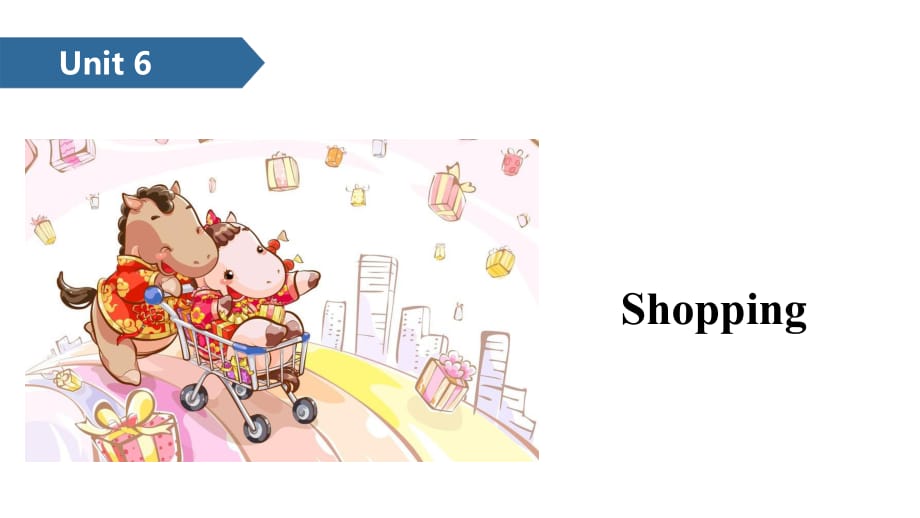《四年級(jí)下冊(cè)英語(yǔ)課件-Unit 6 Shopping B∣人教(PEP)(2014秋) (共15張PPT)》由會(huì)員分享,可在線閱讀����,更多相關(guān)《四年級(jí)下冊(cè)英語(yǔ)課件-Unit 6 Shopping B∣人教(PEP)(2014秋) (共15張PPT)(15頁(yè)珍藏版)》請(qǐng)?jiān)谘b配圖網(wǎng)上搜索。
1����、Unit 6 Shopping IntroduceCan I help you? 我能為您做點(diǎn)什么? Here you are. 給您�����。 Wordssunglasses sngl:sz 名詞�,意為“太陽(yáng)鏡”,因?yàn)樘?yáng)鏡通常有兩個(gè)鏡片組成���,所以用sunglasses�����。 eg:She is wearing a pair of sunglasses. 她正戴著一副太陽(yáng)鏡�����。 Her sunglasses are nice. 她的太陽(yáng)鏡很漂亮���。 小練習(xí):?jiǎn)雾?xiàng)選擇�。 The sunglasses _nice. A. are B. is C.am A Wordsglove lv 名詞���,意為“(分手指的)手套
2��、����?�!?常用短語(yǔ):a pair of gloves 一副手套 eg: She has a pair of gloves. 她有一副手套��。 I want to buy a pair of gloves. 我想買一副手套�����。 I like the gloves. 我喜歡這副手套��。小練習(xí):翻譯句子����。 他正戴著一副手套�。_He is wearing a pair of gloves. Wordsumbrella mbrel 名詞��,意為“雨傘”�。 常用短語(yǔ):an umbrella eg:She has a beautiful umbrella. 她有一把漂亮的雨傘�。 Its raining outside.
3、 I need an umbrella. 外面在下雨�。我需要一把傘。 小練習(xí):?jiǎn)雾?xiàng)選擇�。 He has _umbrella. A. an B. a C. theA Words scarf sk:f 名詞,意為“圍巾���,披巾”��,其復(fù)數(shù)形式為scarves�����。 eg: She has a blue scarf. 她有一條藍(lán)色的圍巾����。 There are many kinds of scarves. 有許多樣式的圍巾��。 小練習(xí):?jiǎn)雾?xiàng)選擇��。 -Can I help you? -I want to buy two_. A. scarf B. scarves C. scarfs B ExpressionsIt
4����、s hot, so I put on my T-shirt. 太熱了�����,所以我穿上了我的T恤衫�����。 so是連詞��,意為“因此����,那么”�,用來(lái)連接兩個(gè)并列的句子。用so連接的句子�,可以轉(zhuǎn)化由because連接的句子,但because和so不能同時(shí)出現(xiàn)在一句話中����。 eg: I like this hat very much, so I buy it at once. 我非常喜歡著這個(gè)帽子,因此我立刻買下了它�。 ExpressionsO ne is big and the other is small. 一只大,另一只小����。 one.the other. 指兩者中的一個(gè)和另一個(gè) eg: I have two
5、pencils. One is green, the other is red. 我有兩支鉛筆���。一支是綠色的����,另一支是紅色的����。小練習(xí):?jiǎn)雾?xiàng)選擇。 I have two scarves. One is blue, _ is purple. A. the other B. other C the othersA DialogueRead aloud. 大聲讀�����。park 公園 dinner 晚飯 girl 女孩 wall 墻circle 圓圈 nurse 護(hù)士 card 卡片 little 小 world 世界 work 工作 sir 先生 turn 轉(zhuǎn)動(dòng)mall 購(gòu)物中心 people 人們 co
6�����、mputer 計(jì)算機(jī) homework 家庭作業(yè) Expand Im sick 隆冬時(shí)節(jié)����,外面正是凜冽寒風(fēng),看著窗外飄著的雪花����,真是不想出門�。這樣的天氣���,人們最容易生病了�。不過(guò)當(dāng)你喉嚨腫痛的時(shí)候�����,你就不得不說(shuō)上一句:“Im sick.” (我生病了)或者“Ive got a cold.”(我感冒了)但多數(shù)情況你都是因?yàn)閒lu(流感)而生病的�����,所以這個(gè)流行的“have the flu”你也要記住?��?! 不過(guò)你只說(shuō)“Im sick.”可沒(méi)人知道你哪里不舒服呀��!所以如果要go to see a doctor(去看病)�����,還要說(shuō)清到底你是哪兒難受。比如:Ive got (had) a headache.(
7�����、我頭疼��。)I have a sore throat.(我喉嚨疼���。) 如果醫(yī)生問(wèn)你有什么癥狀,你就可以告訴他“My nose is running.”(我流鼻涕�。 )等感冒的癥狀。 但如果你說(shuō):“Ive had toothache all day.”(我的牙疼了一整天����。) 那么醫(yī)生 就不會(huì)給你開感冒藥了。所以你只有說(shuō)清楚了����,醫(yī)生才能對(duì)癥下藥呀! Summary Its hot put on sunglasses glove umbrella scarf Exercise找出與其他劃線部分發(fā)音不同的選項(xiàng)�。( )1. A. dinner B. computer C. her( )2. A. car
8、B. work C. mark( )3. A. girl B. sir C. wall( )4. A. short B. horse C. workCBCC Exercise按要求寫出下列單詞的形式����。1. long (反義詞)_ 2. scarf (復(fù)數(shù))_3. big (反義詞)_ 4. sheep (復(fù)數(shù)) _5. hot (反義詞)_ 6. tomato(復(fù)數(shù))_ small sheep cold short scarvestomatoes Exercise單項(xiàng)選擇。( )1. _ I help you ? A. Can B. Are C. What( )2. -Can I try it on ? - _ . A. Thanks B. Cool C. Sure( )3. I want _ gloves A. one B. two C. a pair of ( )4. The gloves are nice . Can I try _ on ? A. them B. it C. they. A A CC HomeworkWrite your own shopping list.
 四年級(jí)下冊(cè)英語(yǔ)課件-Unit 6 Shopping B∣人教(PEP)(2014秋) (共15張PPT)
四年級(jí)下冊(cè)英語(yǔ)課件-Unit 6 Shopping B∣人教(PEP)(2014秋) (共15張PPT)

